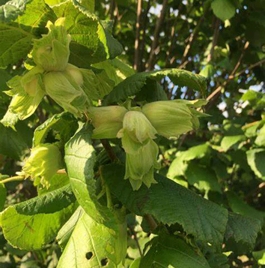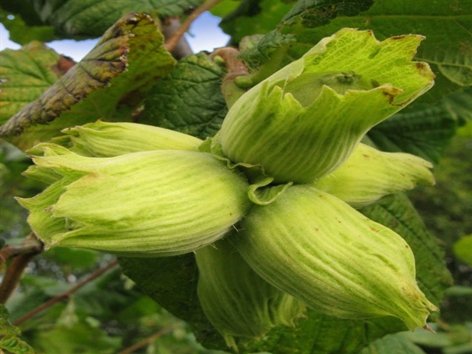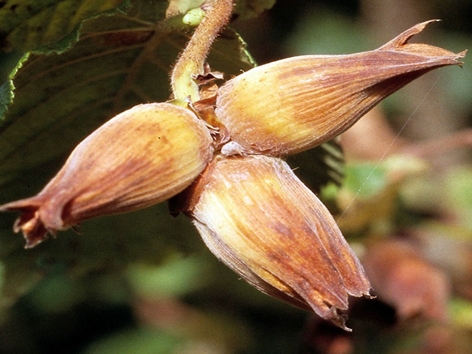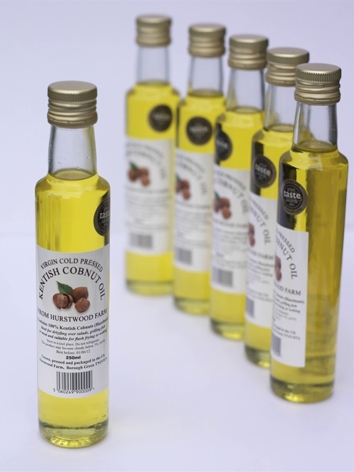

Back in early October, my friend Graham Hill enthusiastically introduced me to Richard Dain at Hurstwood Farm
Graham's company Apple Logistics supplies Richard with bulk bins to store his Cobnuts and Walnuts in at harvest.
Below: Richard Dain with his assistant Catherine and Milo the Great Dane
Richard Dain; is he Superman, or "what" - a grower of Cobnuts and Walnuts, and a Piano Master as well. All remarkable, and he is now 95 years of age with an insatiable appetite for looking ahead!
Richard told me the farm was bought by his Step Father in 1948, At that time populated with Cox Orange Pippin, a very profitable variety in the 'post war years' - in 1985 Richard inherited the farm and set about changing the apples for Cobnuts and Walnuts
Below: Cobnuts on the tree ahead of harvest
 Not content with growing Cobnuts and Walnuts, Richard has a passion for Piano's
Not content with growing Cobnuts and Walnuts, Richard has a passion for Piano's
A trained engineer from his youth, Richard has a 'boyish enthusiasm' and inherent genius for idendtifying areas of potential improvement, whether in machinery or piano and loves to 'tinker'
What is a Cobnut? A cobnut is what we call a cultivated hazelnut. There are many varieties of cultivated hazelnut, just as there are many kinds of apple.
Cob Nuts & Walnuts
How Richard got into producing Kentish Cobnuts and why he chose this particular product
Extract from Hurstwood Farm website.
Nestled in the picturesque Kentish countryside, Hurstwood Farm's idylic nut orchards stretch to the horizon, covered with cobnut and walnut trees. With the cobnut trees planted in 1985, Richard has experimented with different varieties in order to produce the best cobnuts possible.
Hurstwood Farm is a nature reserve and so the trees are given time to reach full maturity before being harvested. As well as producing fresh and dried cobnuts, Hurstwood Farm specialises in producing cobnut oil. This labour intensive product requires a kilo of nuts to a bottle, but the final product is well worth it.
Visitors interested in pianos and piano music are welcome to visit our display.
"We show and offer all the premium makes including our own design called Phoenix which is made under licence from us in Germany. It is the first commercial piano in the World to use carbon fibre for the sound board. We believe this is the first quality piano to be designed in the UK since the days of John Broadwood who designed the piano used and favoured by Beethoven".
More about piano's in next week's English Apple Man Journal
Hurstwood Farm: "Pianos for us are a typical farm alternative business line that is vital to subsidise the ailing, circumscribed and politically unwanted business of food production in the UK".
Below: a Cobnut and Walnut Plat at Hurstwood Farm
I arrive at Hurstwood Farm a little ahead of my schedule, no sign of anyone and Graham clearly still on his way!
I spy a Cobnut Plat ahead and park nearby. Still no sign of anyone, when suddenly this very large dog trots up to me!
After a second or two of marginally raised heartbeat, I realise he is very friendly.
Then Richard appears from the shadows and after initial introductions, Milo the Great Dane licks me all over!
Below: left. Cobnuts at the green stage and right. more advanced at the brown stage


Cobnut harvesting
As we observe the harvest sweeper machine at work, Richard explains that prior to the introduction of the harvester it required around 40 people to pick up the Cobnuts by hand. Without a tree shaker which would speed up the drop, Richard said normal practice is to sweep the Plat 4 times as the Cobnuts fall naturally.
The Cobnut sweeper is a sophisticated machine. The sweeping action is just the start of the journey from the ground to collection bin at the rear of the machine.
As the Cobnuts are swept into the mouth of the machine, a process of fingers and air movement remove any unwanted debris, the nuts then travel through a network of pipes removing any remaining debris, before transferring the Cobnuts into the reservoir at the ear of the machine and sending any debris onto the orchard floor.
Below: 'Pawel' sweeping up the fallen Cobnuts
'
Below: left. Loading bins of harvested Cobnuts into de-husking machine and right. De-Husking machine.
In the video below, the de-husking process can be seen
Click on Video Machine removing husks
Below: left. Cobnuts after de-husking and right. Nut cracking machine
Below: left. Cobnuts after machine cracking (some need to be fed through a 2nd time) and right. redundant shells
Kentish Cobnut Oil
Kentish Cobnut oil is an intensely nutty virgin cold-pressed oil. The nuts are grown, pressed and bottled in the UK. This is a delicious new oil which can be used in the same way as a premium olive oil - in salad dressings, for drizzling on vegetables and for grilling (especially chicken and fish). It is also useful in baking and is wonderful for roasting vegetables. With autumn approaching, pumpkin roasted in Cobnut Oil and made into soup, is a delightful seasonal dish. See our 'Autumn recipes' website for the full recipe.
Kentish Cobnut Oil contains NO cholesterol. It will instil extra flavour into a meal, allowing you to enjoy a taste of indulgence and luxury without feeling guilty!
The oil contains Vitamin E, essential for good health. It also contains linoleic acid, vital for healthy growth and development, along with Vitamins B1, B2 and B6. Kings College Hospital are experimenting with nut oils as they are believed to be excellent for the skin, and in treating skin conditions (eg psoriasis).
Over a kilo of picked nuts go into each bottle. They are then dried, and cracked (shelled) before the kernels are pressed for oil. The oil contains 100% cobnut kernels with nothing added or taken away. It is a virgin, cold-pressed oil of the highest quality available. We invite people to taste the oil, and to give us their opinion. We love to see the response received when the oil is first tasted � the surprisingly intensely nutty flavour almost always receives a positive comment from those who taste it.
Below: Richard demonstrates the bottling procedure and right. Hurstwood Farm 'Kentish' Cobnut Oil

From the website....
"Our general conclusions after over twenty-six years of growing nuts are that Kent Cob is a good quality and reliable variety to choose for UK producers. Until we developed machines able to crack and dehusk such spade shaped nuts with a long husk , Kent Cob was ruled out for selling in a big proportion of the available market. That situation has now changed dramatically since we developed our own cracker machine (available from Goodland Engineering in Tonbridge for a very modest sum).
"We have, in the past, produced substantial amounts of Cobnut and Walnut oil. The former has recently been found to have interesting medicinal uses for cure of psoriasis and other skin diseases as well as being a proven health food and a delight in confectionery. Walnut oil is excellent for salads and frying because it is a relatively high temperature oil.
There is now a strong market for virgin nut oils. One typically gets about 400 litres per tonne of kernels (Up to 500 litres per tonne with luck and a fair wind.) This is equivalent to say 200 litres per tonne of fresh picked nuts. The nuts have to be dried before they can be cracked and must be shelled before pressing for oil.
The shells are an interesting feed for wood burning stoves and may have value as a fuel greater than that of the kernels. We are considering making the broken shells into briquettes for home fires instead of coal or logs.
We consider the sale of fresh green nuts via supermarkets is no longer commercially viable. The shelf life is too short, The stores find it difficult to handle and the public is becoming too lazy to use nut crackers and want their nuts shelled for them "like American peanuts"
In 2023 we will sell our entire cobnut harvest for seed, to grow new trees. We are required to de-husk the nuts but they are otherwise unprocessed. This represents a huge saving in the labour and cost of drying, cracking and pressing.
![]() That is all for this week, next week The Journal will feature Hurstwood Farm Walnuts and Pianos
That is all for this week, next week The Journal will feature Hurstwood Farm Walnuts and Pianos
Take care
The English Apple Man